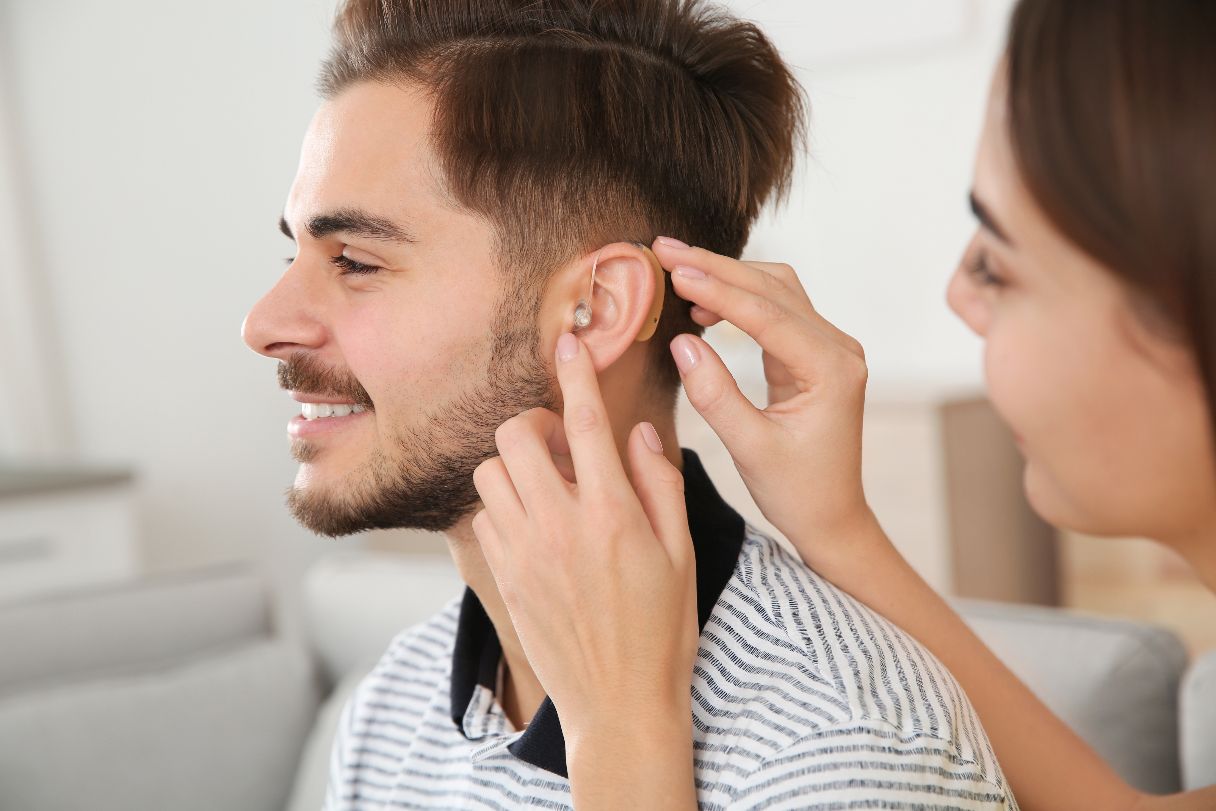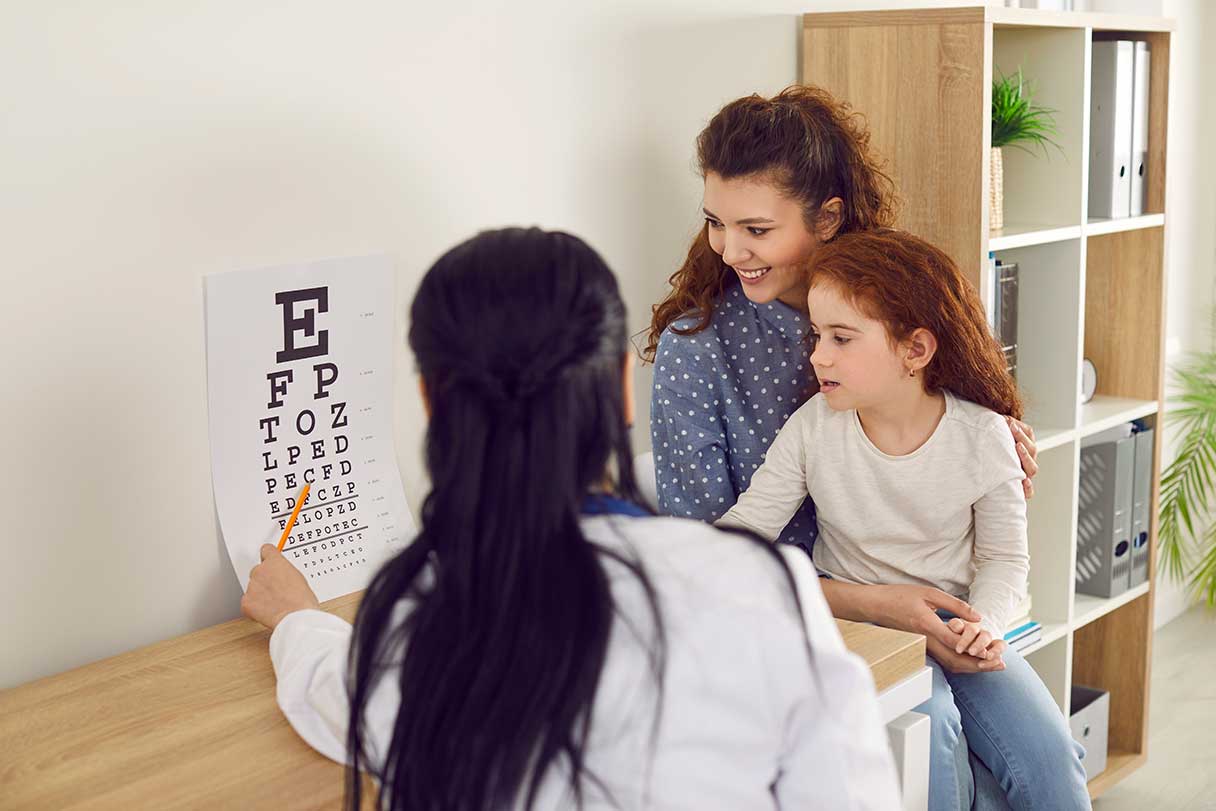Do you find yourself often asking people to repeat themselves? Maybe you struggle to follow conversations in noisy places or feel like the volume is always creeping higher on your favorite TV show. If so, you may be one of the 15% of adults aged 18 or older in the United States who are experiencing hearing trouble. This percentage goes up as we age, with 55% of people aged 75 and older reporting hearing loss.1
If you or a loved one is having trouble hearing, it may be a good idea to get it checked out by taking a hearing test.
What Is a Hearing Test?
A hearing test is an easy way to figure out how well your ears perceive pitch and volume at different frequencies. Hearing tests are simple, fast and pain-free and are typically performed by a doctor, audiologist or medical professional trained to do hearing screenings.
They typically involve wearing headphones or having a probe placed in each ear. The healthcare professional may first use an otoscope to look in your ear to see any obvious causes of hearing problems, such as wax buildup, a ruptured eardrum or signs of infection.
Types of Hearing Tests
Different types of hearing tests are designed to evaluate hearing from different sections of the ear (outer ear, middle ear, inner ear) to help determine which part of the hearing pathway isn’t working properly.2
The most common types of hearing tests include:
- Acoustic reflex measurement
- Otoscopy
- Pure tone audiometry
- Speech and word recognition
- Tuning fork
- Tympanometry
Your healthcare provider can help you determine which hearing test is right for your needs.
Hearing Test Costs
The national average cost* of a hearing test can vary between $18 and $85, depending upon the type of hearing test, who is conducting the hearing test and the geographic location of the test.3
Average cost of hearing tests by type
Below are the average costs* and cost ranges for the different types of hearing tests:3
| Type | Average cost | Cost range |
|---|---|---|
| Acoustic reflex measurement | $15 | $12-29 |
| Otoscopy | $40 | $31 to $76 |
| Pure tone air conduction audiometry | $45 | $35 to $84 |
| Speech and word recognition | $45 | $36 to $83 |
| Tuning fork | $46 | $35 to $85 |
| Tympanometry | $23 | $18 to $44 |
Average cost of hearing tests by state/district
Below are the average costs* for a pure tone air conduction audiometry test by all 50 states and the District of Columbia:3
| State/District | Average cost |
|---|---|
| Alabama | $40 |
| Alaska | $55 |
| Arizona | $46 |
| Arkansas | $39 |
| California | $58 |
| Colorado | $46 |
| Connecticut | $49 |
| Delaware | $45 |
| District of Columbia | $57 |
| Florida | $45 |
| Georgia | $41 |
| Hawaii | $66 |
| Idaho | $46 |
| Illinois | $42 |
| Indiana | $41 |
| Iowa | $39 |
| Kansas | $40 |
| Kentucky | $41 |
| Louisiana | $42 |
| Maine | $45 |
| Maryland | $53 |
| Massachusetts | $53 |
| Michigan | $42 |
| Minnesota | $43 |
| Mississippi | $40 |
| Missouri | $40 |
| Montana | $44 |
| Nebraska | $40 |
| Nevada | $45 |
| New Hampshire | $49 |
| New Jersey | $50 |
| New Mexico | $42 |
| New York | $48 |
| North Carolina | $42 |
| North Dakota | $41 |
| Ohio | $43 |
| Oklahoma | $39 |
| Oregon | $49 |
| Pennsylvania | $44 |
| Rhode Island | $49 |
| South Carolina | $43 |
| South Dakota | $41 |
| Tennessee | $39 |
| Texas | $42 |
| Utah | $46 |
| Vermont | $47 |
| Virginia | $44 |
| Washington | $53 |
| West Virginia | $40 |
| Wisconsin | $42 |
| Wyoming | $41 |
Why Would You Need a Hearing Test?
Adult hearing screening is recommended starting at age 50.4 If you or a loved one are experiencing symptoms of hearing loss, you should consult with a doctor.
Common symptoms of hearing loss include:5
- Balance issues or dizziness6
- Difficulty understanding phone conversations
- Difficulty understanding speech during a conversation
- Friends or family commenting that you don’t respond to them
- Needing to turn up the volume on the television or radio
- Sounds are louder in one ear6
- Thinking sounds are muffled6
- Tinnitus (ringing or buzzing in the ears)
Understanding Your Hearing Test Results
Common hearing tests are meant to be a screening and, therefore, the results are not foolproof. There are many reasons you might fail a hearing test but not have hearing loss, such as:
- Ear infection
- Ear wax buildup
- Fluid in the middle ear
- Loud background noise
- Nasal congestion at the time of screening
If your doctor suspects one of these issues is causing the failed test, they will typically pair the screening with an otoscopy to easily look in your ear to check.
Alternatively, you may pass a common hearing test but still have trouble hearing. This is because not all hearing loss stems from the ear. It may indicate a processing problem with the neural pathway from the ear to the brain, also called sensorineural hearing loss. If this type of hearing loss is suspected, you will be referred to a hearing specialist to undergo further testing and evaluation.
Common causes of sensorineural hearing loss include:7
- A problem in the way the ear was formed
- Age-related hearing loss
- Autoimmune disease (lupus, rheumatoid arthritis, vitiligo)8
- Certain medications (aspirin, loop diuretics, antibiotics)9
- Head trauma
- Loud noises
How Is Hearing Loss Treated?
When hearing loss is detected, the doctor or specialist will first treat the underlying cause. If permanent hearing loss is suspected, then hearing aids will typically be recommended. Hearing aids can be beneficial for mild to severe hearing loss.
Hearing aids are available over the counter for people experiencing mild to moderate hearing loss. If you are experiencing severe hearing loss, a prescription will be needed to ensure you get the appropriate equipment.10
If you or a loved one is having trouble hearing or experiencing signs of hearing loss, consult a doctor who may recommend a hearing test and a possible hearing evaluation by a specialist.
Frequently Asked Questions
Do you still have questions about hearing tests? Here are some answers to commonly asked questions about these screenings.
Test Your Hearing Online
Financing Ear Care With the CareCredit Credit Card
The CareCredit credit card can help you pay for hearing care, including regular hearing tests, screenings and more.** Use our Acceptance Locator to find a hearing specialist near you that accepts CareCredit. Continue to invest in your wellness journey by downloading the CareCredit Mobile App to manage your account, find a provider on the go and easily access the Well U blog for more great articles, podcasts and videos.
In addition to hearing care, you can also use your CareCredit credit card for dentistry, cosmetic, pet care, vision, health systems, dermatology, pharmacy purchases, spa treatments and so much more within the CareCredit network. How will you invest in your health and wellness next?
Author Bio
Amy Isler, M.S.N., R.N., has more than a decade of nursing expertise. She combines her nursing experience and journalism background to create engaging and educational healthcare content for leading brands and publications, including GoodRx, Verywell Health, Vision Center and more. Her mission in writing is to provide positive, accurate and informative articles for consumers.








